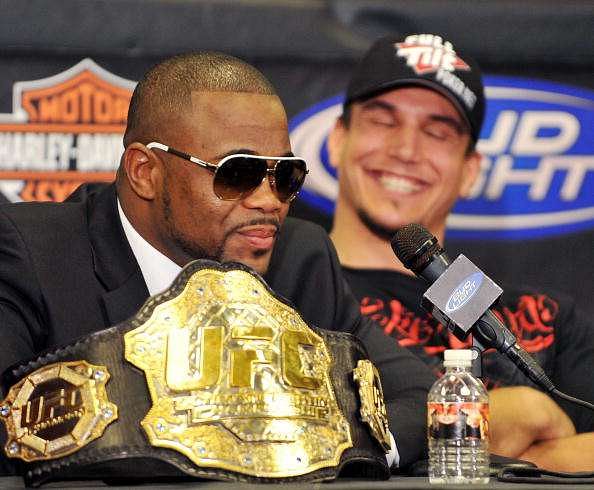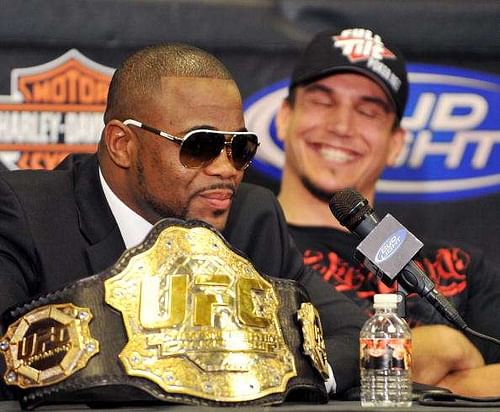
Fall from Grace: Rashad Evans

This is the first of a new series I’ll be writing for Sportskeeda called ‘Fall from Grace’ – the idea being to profile an MMA fighter who’s fallen on hard times in their career, look at exactly what led to their downward slide and whether they can recover from it or not.
As a disclaimer, I must add that in no way do I mean any disrespect to any of the fighters with this series. I’ve got the utmost respect for anyone who steps into the cage – even at an amateur level – and it’s more a look at what causes great fighters to decline rather than a fighter bashing-fest.
At the end of the day, it’s part and parcel of any sport that once-great athletes eventually decline. The reasons can be myriad and in MMA it’s often tricky to tell exactly who’s on a slide, given the matchmaking system and the unpredictability of the sport.
In this inaugural edition, I’m looking at a likely future UFC Hall of Famer and undoubtedly one of the best 205lbers to ever step into the Octagon, former UFC Light-Heavyweight Champion, Rashad Evans.
The Initial Rise and Fall
Rashad’s career is almost weird in a way, largely because he reached the top of the mountain very quickly, and was then knocked off the top almost as quickly as he reached the summit.
It was 2005 when we first saw Rashad on UFC programming as he was cast on the second series of The Ultimate Fighter. A Division I wrestler who narrowly missed out on All-American status, Rashad also happened to be the smallest man out of the Heavyweight cast.
According to most sources, Dana White wrote him off before the tapings even began, which made sense given that behemoths such as Brad Imes and Dan Christison were part of that TUF roster.
Rashad proved everyone wrong, though, as it turned out that his size disadvantage actually offered him an advantage in speed. He beat Tom Murphy, and then took apart favourites Mike Whitehead and Keith Jardine to secure his spot in the finals, where he beat the afore-mentioned Imes by decision.
Ironically enough, both Whitehead and Jardine would go on to regularly fight at 205lbs just like Rashad.
A drop to 205lbs and a series of wins followed, each looking more impressive than the last until a highlight reel knockout of Sean Salmon was the catalyst to push him to the next level. At UFC 73, Rashad was faced with former 205lbs champion Tito Ortiz, the biggest star of the pre-TUF era.
It proved to be a test that Rashad was unable to pass.
For the first time in his career, it seemed that his lack of size stood against him, as Ortiz dominated the early going with his takedowns and clinch work. Evans fought back in the later rounds, but it was only a deducted point for Ortiz (due to a fence grab) that allowed Rashad to come away with a draw.
A rematch with Ortiz seemed to be on the cards. Instead, Evans was matched with fellow TUF winner Michael Bisping. After a tough fight, Rashad came away with another decision win and then took just under a year off.
The layoff proved to be worth it.
Rashad returned to his first ever UFC main event, a fight with arguably the biggest star in company history to that point, former champion Chuck Liddell. Coming in, a lot of analysts gave Liddell the advantage, the belief being that he’d always dealt well with wrestlers like Rashad.
A monstrous overhand right from Rashad changed all that.
It turned out that again, speed was the key to Rashad’s success. Where in the past, Liddell had always been able to land the killer counterpunch, Rashad was simply too quick on the draw for him. It was the knockout that put Liddell’s career on the slide and set Rashad up for a title fight with fellow TUF star Forrest Griffin.
Again, it was speed and explosiveness that made the difference. Forrest took the first two rounds with his boxing and leg kicks, but in the third Rashad countered a kick with a jackhammer right hand. Heavy punches on the ground followed and Rashad Evans was the new UFC Light-Heavyweight champion, just three years after winning TUF.
Unfortunately for Rashad, his time at the top would prove to be fleeting. When a possible first defence against Quinton ‘Rampage’ Jackson was postponed due to a jaw injury to Rampage, the UFC booked Evans against fellow undefeated star, karate expert Lyoto Machida.
Yours truly felt that Rashad’s speed and explosiveness would give him the advantage again, but for the first time that wasn’t the case. Instead, Lyoto’s management of distance and his ability to spring in hit Evans and then spring back out exposed some flaws in Rashad’s game.
He couldn’t catch Lyoto with a big shot and he was unable to use his wrestling game at all. The fight also proved that his chin was nowhere near invulnerable. After a second round flurry, Rashad was unconscious and the UFC had another new champion.